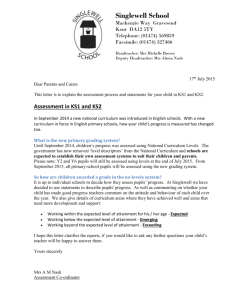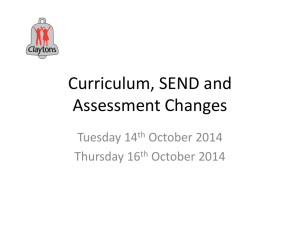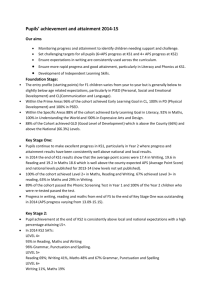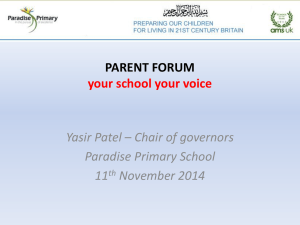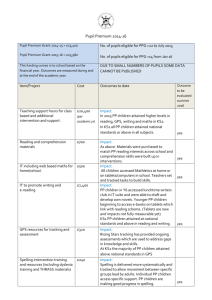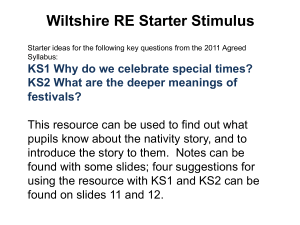SEF - Canterbury Cross Primary School
advertisement
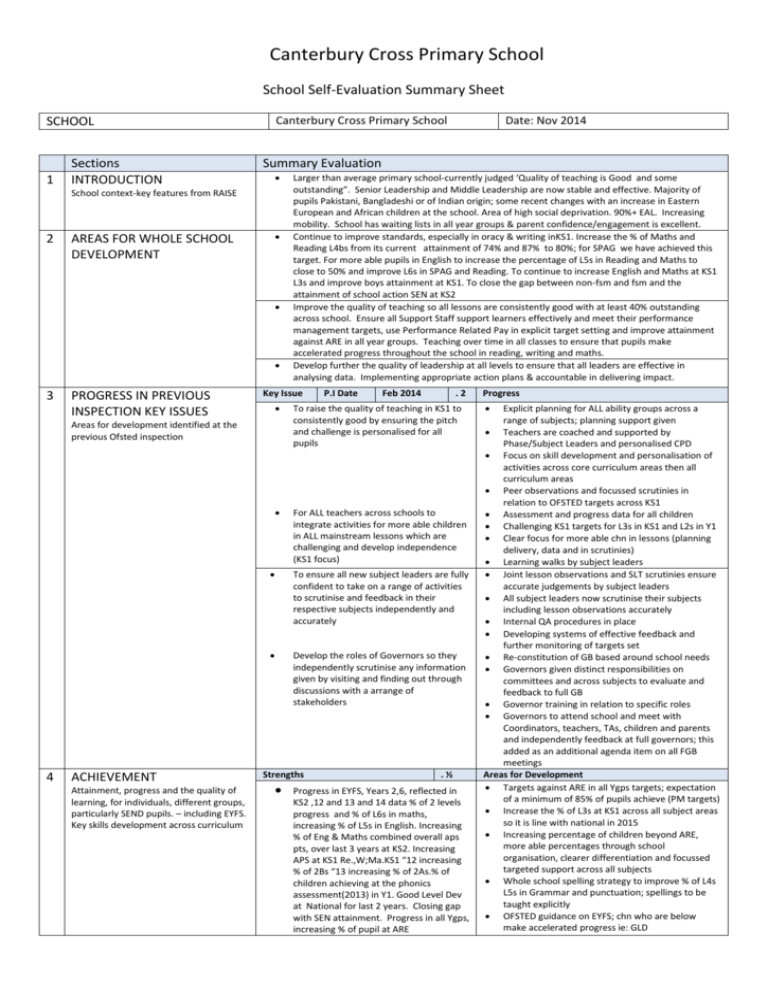
Canterbury Cross Primary School School Self-Evaluation Summary Sheet Canterbury Cross Primary School SCHOOL 1 Sections INTRODUCTION Summary Evaluation School context-key features from RAISE 2 AREAS FOR WHOLE SCHOOL DEVELOPMENT 3 PROGRESS IN PREVIOUS INSPECTION KEY ISSUES ACHIEVEMENT Attainment, progress and the quality of learning, for individuals, different groups, particularly SEND pupils. – including EYFS. Key skills development across curriculum Larger than average primary school-currently judged ‘Quality of teaching is Good and some outstanding”. Senior Leadership and Middle Leadership are now stable and effective. Majority of pupils Pakistani, Bangladeshi or of Indian origin; some recent changes with an increase in Eastern European and African children at the school. Area of high social deprivation. 90%+ EAL. Increasing mobility. School has waiting lists in all year groups & parent confidence/engagement is excellent. Continue to improve standards, especially in oracy & writing inKS1. Increase the % of Maths and Reading L4bs from its current attainment of 74% and 87% to 80%; for SPAG we have achieved this target. For more able pupils in English to increase the percentage of L5s in Reading and Maths to close to 50% and improve L6s in SPAG and Reading. To continue to increase English and Maths at KS1 L3s and improve boys attainment at KS1. To close the gap between non-fsm and fsm and the attainment of school action SEN at KS2 Improve the quality of teaching so all lessons are consistently good with at least 40% outstanding across school. Ensure all Support Staff support learners effectively and meet their performance management targets, use Performance Related Pay in explicit target setting and improve attainment against ARE in all year groups. Teaching over time in all classes to ensure that pupils make accelerated progress throughout the school in reading, writing and maths. Develop further the quality of leadership at all levels to ensure that all leaders are effective in analysing data. Implementing appropriate action plans & accountable in delivering impact. Key Issue P.I Date Feb 2014 .2 To raise the quality of teaching in KS1 to consistently good by ensuring the pitch and challenge is personalised for all pupils For ALL teachers across schools to integrate activities for more able children in ALL mainstream lessons which are challenging and develop independence (KS1 focus) Areas for development identified at the previous Ofsted inspection 4 Date: Nov 2014 To ensure all new subject leaders are fully confident to take on a range of activities to scrutinise and feedback in their respective subjects independently and accurately Develop the roles of Governors so they independently scrutinise any information given by visiting and finding out through discussions with a arrange of stakeholders Strengths .½ Progress in EYFS, Years 2,6, reflected in KS2 ,12 and 13 and 14 data % of 2 levels progress and % of L6s in maths, increasing % of L5s in English. Increasing % of Eng & Maths combined overall aps pts, over last 3 years at KS2. Increasing APS at KS1 Re.,W;Ma.KS1 “12 increasing % of 2Bs “13 increasing % of 2As.% of children achieving at the phonics assessment(2013) in Y1. Good Level Dev at National for last 2 years. Closing gap with SEN attainment. Progress in all Ygps, increasing % of pupil at ARE Progress Explicit planning for ALL ability groups across a range of subjects; planning support given Teachers are coached and supported by Phase/Subject Leaders and personalised CPD Focus on skill development and personalisation of activities across core curriculum areas then all curriculum areas Peer observations and focussed scrutinies in relation to OFSTED targets across KS1 Assessment and progress data for all children Challenging KS1 targets for L3s in KS1 and L2s in Y1 Clear focus for more able chn in lessons (planning delivery, data and in scrutinies) Learning walks by subject leaders Joint lesson observations and SLT scrutinies ensure accurate judgements by subject leaders All subject leaders now scrutinise their subjects including lesson observations accurately Internal QA procedures in place Developing systems of effective feedback and further monitoring of targets set Re-constitution of GB based around school needs Governors given distinct responsibilities on committees and across subjects to evaluate and feedback to full GB Governor training in relation to specific roles Governors to attend school and meet with Coordinators, teachers, TAs, children and parents and independently feedback at full governors; this added as an additional agenda item on all FGB meetings Areas for Development Targets against ARE in all Ygps targets; expectation of a minimum of 85% of pupils achieve (PM targets) Increase the % of L3s at KS1 across all subject areas so it is line with national in 2015 Increasing percentage of children beyond ARE, more able percentages through school organisation, clearer differentiation and focussed targeted support across all subjects Whole school spelling strategy to improve % of L4s L5s in Grammar and punctuation; spellings to be taught explicitly OFSTED guidance on EYFS; chn who are below make accelerated progress ie: GLD Value added over 100 for last 3 years 100% expected progress at KS2 and better than expected progress above national for all subjects and sub-levels Pupil Premium pupils continue to make very good progress throughout school and at KS2 assessments Progress of SEND chn at KS1 5 TEACHING Strengths Teacher subject knowledge and pupil expectations, engagement, motivation, challenge, progress, independence, assessment and next steps, marking, feedback .½ 95% of teaching is now consistently good with at least 30% consistently better – termly lesson observations for TAS Enjoyment, engagement in learning strong. Performance Management for Teachers and TAs systems strong all targets impact driven. Teacher modelling and demonstrating are used to good effect, greater challenge is provided for more able pupils in lessons and as additional lessons. Strong focussed AfL with precise understanding of pupils’ needs Reading and literacy skills 6 BEHAVIOUR AND SAFETY Including behaviour in lessons & around the school, attendance & punctuality, attitudes towards others, how well protected from bullying, views of pupils/parents By improvements in teaching, planning and personalised targets for SEND chn Quality of targets on IEPs, Reviews and focussed discussions at pupil progress meetings Areas for Development Increase conversion rates for all pupils, especially to 4Bs across all subjects andlevel 5s for Reading/Maths, focus on Af2,3,4 and spellings L6 reading/SPAG focus with explicit curriculum and targets. Increase the SEND SA attainment at KS2 so it is in line with national attainment Increase the percentage of more able children so they achieve the higher levels in line with peers An increasing percentage of Pupils meeting agerelated expectations in foundation subjects such as art, music , drama and ICT ( floor targets of80%) Continue to accelerate progress for all groups especially in English and Maths, increase the % of outstanding teaching, evidence through annual trends Explicit teaching of spelling and grammar across school reading Explicit grammar teaching in Y1 and Y2 AF2/3/4 Complex sentences/connectives/writing More able reading – quote/analysis test technique More able writing-vocabulary for effect P.M targets explicit in SIP priorities with PM pay Raise the same level of expectation in all foundation subjects; use the OFSTED subject inspection guidance as a measure. Maths Subtraction (must, could, should) Place value (basic skills checklist) Maths in Context (Problem solving) Investigations – Big Maths Continue to develop bespoke curriculum to ensure good progression & application of core skills across ass subjects – monitor impact and adjust as necessary Phonics taught very well in EYFS, Y1 Y2 and targeted chn throughout school, overall it is a strength of the school. Daily KS2 SPAG lessons; - guided reading is consistently strong in all year groups. Next focus explicit teaching of SPAG in Y1 and Y2 in readiness for KS1 SPAG test. Furthermore to develop a reading culture/ different authors (All chn given a free book on World Book Day) Behaviour Judgement .½ Safety Judgement . Well focused teaching of EAL, SEND and pupil premium children result in good progress for all pupils because of individual pupil support and targeted group support daily Overall Strengths *Behaviour is good and in lessons often outstanding, chn engaged and attentive in lessons, chn show self-discipline when un supervised, they are courteous and polite. Bullying very rare – pupils say that they feel very safe and relationships good. Pupils feel empowered – through school council, whole school acronym SHARE embedded, SEAL programmes support this, very low exclusions and significant improvement in attendance. Updated policy and practice in relation to the equality act 2010 and protected characteristics; school policy and practice on life in modern Britain and the national PVE agenda. Partnership at all levels – parental engagement, community, Handsworth Consortium, multi-agency etc. Areas for development staff training for new CP policies; whole school PREVENT training; FGM, Update CP training, in class behaviour monitoring/school system updates in relation to Equality act 2010. Further develop positive and engaging behaviours and motivation for KS1 through the curriculum. Develop chn roles for e.g: school council, prefects and play leaders. 7 LEADERSHIP/MANAGEMENT Strengths How well leaders- demonstrate ambition vision, high expectations improve teaching & learning, dev. Staff, sustains improvement. Accuracy of SSE, appropriate curriculum, equal opps, Parental engagement, safeguards. . 1/2 Senior leaders have driven, ambition & clear vision – driving improved teaching standards Dedicated leadership and subject time with accountability systems to drive initiatives Areas for Development 8 OVERALL EFFECTIVENESS Including promotion of SMSC Partnership at all levels – parental engagement, community, Handsworth Consortium, multi-agency etc. Whole school Assesment systems which are in line with the new curriculum requirements Continued rigour in the use of accurate moderated data to drive improvement in English & ma, Sc, PE and ICT Develop effectiveness of middle leaders in monitoring & holding others to account, termly subject leader plans (See ofsted progess sec 3) Monitor and evaluate our curriculum (New 2014 Curriculum) – with specific focus on learning to learn skills & subject leaders supporting improvement. Implement Music, PHSE,PE and RE for January 2015 Extended Schools and Community Links Coordinator; role development to include pre-caf and caf lead Establish Peer observations across SLT and Subject Leaders; ygp and phase partners Introduce peer observations for support staff Use skills of governors to further develop effectiveness in holding to account the schools leadership team. The overwhelming majority of pupils understand their moral responsibilities as citizens of the local, national & global community – Winner of the European Language Label 2013-2014, further cultural links developed through music; Jeff Rich (Status Quo) drumming workshop Dawood Whansby Ali form Canada. Developed inspirational role models & how our community/society formed - , mutual respect, 2014 WW1 whole school focus in Autumn term; visits to Stratfordshire museum (Updates on school website) SLT track record shows clear capacity for further improvement over time – evidence in Ofsted report Feb 2014 “senior leaders are quick to make full use of assessment data to identify patterns in pupil achievement, putting resources in place to make sure pupils catch up quickly if they fall behind”
